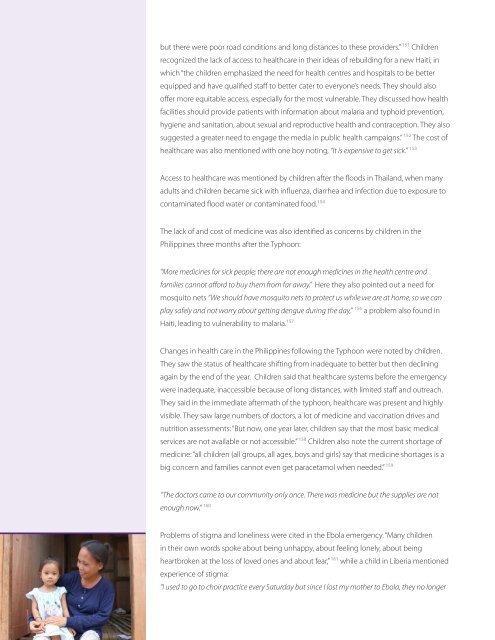putting-children-at-the-heart_full_text_final
putting-children-at-the-heart_full_text_final
putting-children-at-the-heart_full_text_final
- No tags were found...
You also want an ePaper? Increase the reach of your titles
YUMPU automatically turns print PDFs into web optimized ePapers that Google loves.
ut <strong>the</strong>re were poor road conditions and long distances to <strong>the</strong>se providers.” 151 Children<br />
recognized <strong>the</strong> lack of access to healthcare in <strong>the</strong>ir ideas of rebuilding for a new Haiti, in<br />
which “<strong>the</strong> <strong>children</strong> emphasized <strong>the</strong> need for health centres and hospitals to be better<br />
equipped and have qualified staff to better c<strong>at</strong>er to everyone’s needs. They should also<br />
offer more equitable access, especially for <strong>the</strong> most vulnerable. They discussed how health<br />
facilities should provide p<strong>at</strong>ients with inform<strong>at</strong>ion about malaria and typhoid prevention,<br />
hygiene and sanit<strong>at</strong>ion, about sexual and reproductive health and contraception. They also<br />
suggested a gre<strong>at</strong>er need to engage <strong>the</strong> media in public health campaigns.” 152 The cost of<br />
healthcare was also mentioned with one boy noting, “It is expensive to get sick.” 153<br />
Access to healthcare was mentioned by <strong>children</strong> after <strong>the</strong> floods in Thailand, when many<br />
adults and <strong>children</strong> became sick with influenza, diarrhea and infection due to exposure to<br />
contamin<strong>at</strong>ed flood w<strong>at</strong>er or contamin<strong>at</strong>ed food. 154<br />
The lack of and cost of medicine was also identified as concerns by <strong>children</strong> in <strong>the</strong><br />
Philippines three months after <strong>the</strong> Typhoon:<br />
“More medicines for sick people; <strong>the</strong>re are not enough medicines in <strong>the</strong> health centre and<br />
families cannot afford to buy <strong>the</strong>m from far away.” Here <strong>the</strong>y also pointed out a need for<br />
mosquito nets “We should have mosquito nets to protect us while we are <strong>at</strong> home, so we can<br />
play safely and not worry about getting dengue during <strong>the</strong> day,” 156 a problem also found in<br />
Haiti, leading to vulnerability to malaria. 157<br />
Changes in health care in <strong>the</strong> Philippines following <strong>the</strong> Typhoon were noted by <strong>children</strong>.<br />
They saw <strong>the</strong> st<strong>at</strong>us of healthcare shifting from inadequ<strong>at</strong>e to better but <strong>the</strong>n declining<br />
again by <strong>the</strong> end of <strong>the</strong> year. Children said th<strong>at</strong> healthcare systems before <strong>the</strong> emergency<br />
were inadequ<strong>at</strong>e, inaccessible because of long distances, with limited staff and outreach.<br />
They said in <strong>the</strong> immedi<strong>at</strong>e afterm<strong>at</strong>h of <strong>the</strong> typhoon, healthcare was present and highly<br />
visible. They saw large numbers of doctors, a lot of medicine and vaccin<strong>at</strong>ion drives and<br />
nutrition assessments: “But now, one year l<strong>at</strong>er, <strong>children</strong> say th<strong>at</strong> <strong>the</strong> most basic medical<br />
services are not available or not accessible.” 158 Children also note <strong>the</strong> current shortage of<br />
medicine: “all <strong>children</strong> (all groups, all ages, boys and girls) say th<strong>at</strong> medicine shortages is a<br />
big concern and families cannot even get paracetamol when needed.” 159<br />
“The doctors came to our community only once. There was medicine but <strong>the</strong> supplies are not<br />
enough now.” 160<br />
Problems of stigma and loneliness were cited in <strong>the</strong> Ebola emergency. “Many <strong>children</strong><br />
in <strong>the</strong>ir own words spoke about being unhappy, about feeling lonely, about being<br />
<strong>heart</strong>broken <strong>at</strong> <strong>the</strong> loss of loved ones and about fear,” 161 while a child in Liberia mentioned<br />
experience of stigma:<br />
“I used to go to choir practice every S<strong>at</strong>urday but since I lost my mo<strong>the</strong>r to Ebola, <strong>the</strong>y no longer


